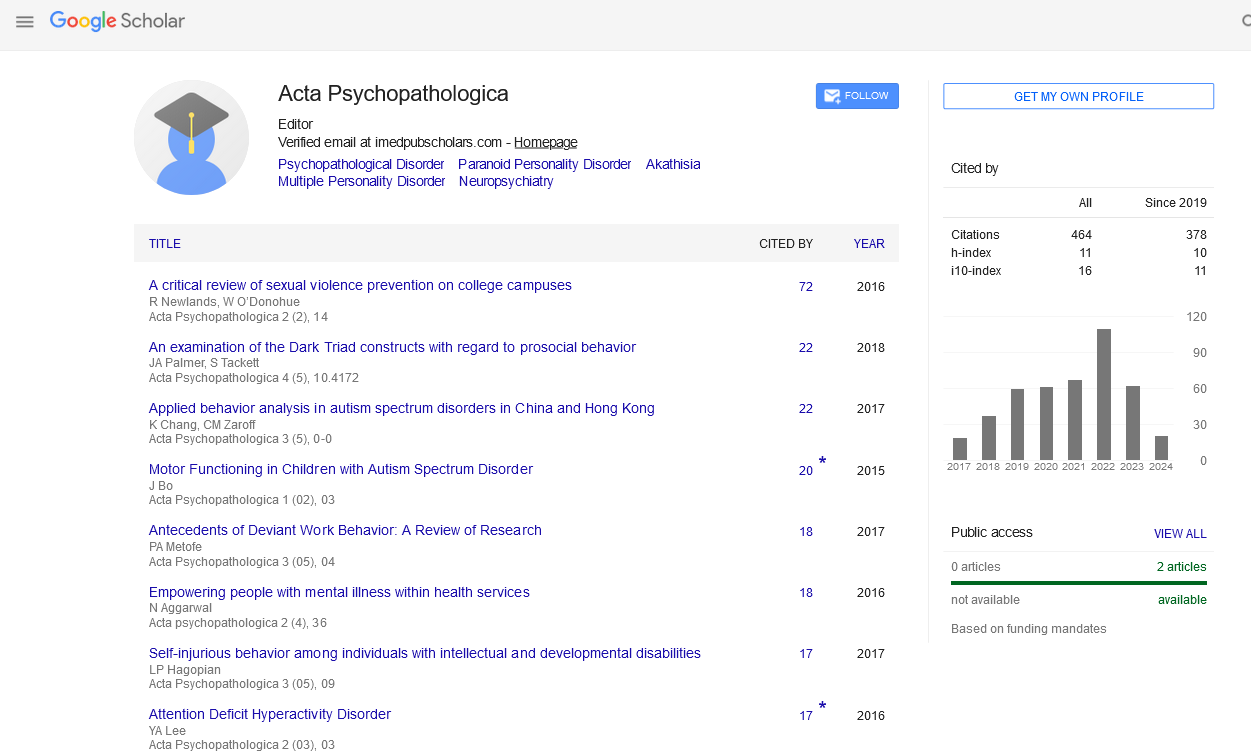Indexed In
- China National Knowledge Infrastructure (CNKI)
- CiteFactor
- Electronic Journals Library
- Directory of Research Journal Indexing (DRJI)
- OCLC- WorldCat
- Publons
- Geneva Foundation for Medical Education and Research
- Google Scholar
- SHERPA ROMEO
- Secret Search Engine Labs
- Serials Union Catalogue (SUNCAT)
Useful Links
Share This Page
Journal Flyer

Open Access Journals
- Agri and Aquaculture
- Biochemistry
- Bioinformatics & Systems Biology
- Business & Management
- Chemistry
- Clinical Sciences
- Engineering
- Food & Nutrition
- General Science
- Genetics & Molecular Biology
- Immunology & Microbiology
- Medical Sciences
- Neuroscience & Psychology
- Nursing & Health Care
- Pharmaceutical Sciences
Opinion - (2024) Volume 10, Issue 5
The Cognitive Consequences of Acute Stress: Impacts on Statistical Learning and Episodic Memory
Gina Wren*Received: 01-May-2024, Manuscript No. IPAP-24-20475; Editor assigned: 03-May-2024, Pre QC No. IPAP-24-20475 (PQ); Reviewed: 17-May-2024, QC No. IPAP-24-20475; Revised: 22-May-2024, Manuscript No. IPAP-24-20475 (R); Published: 29-May-2024, DOI: 10.36648/2469-6676-10.05.44
Introduction
Acute stress, a short-term physiological response to an immediate perceived threat, can significantly affect cognitive functions, particularly statistical learning and episodic memory. Statistical learning, the ability to detect patterns and regularities in the environment, and episodic memory, the ability to recall personal experiences and specific events, are both critical for everyday functioning.
Description
Understanding how acute stress influences these cognitive processes can provide insights into stress management and cognitive performance optimization. Research indicates that acute stress can impair statistical learning. Under stress, the body releases glucocorticoids, which can influence the brain’s functioning, particularly in regions like the hippocampus and prefrontal cortex, areas crucial for learning and memory. The heightened levels of cortisol associated with stress can disrupt neural circuits involved in statistical learning, leading to difficulties in recognizing patterns or regularities in information. This disruption is particularly evident in tasks requiring the integration of new information over time, where stress can reduce accuracy and efficiency. One key mechanism through which acute stress affects statistical learning is through its impact on attentional resources. Stress can narrow attention, focusing cognitive resources on immediate threats at the expense of broader, more abstract processing. This narrowed focus can hinder the ability to pick up on subtle patterns and regularities in the environment, which are essential for effective statistical learning. Additionally, stress-induced changes in dopamine levels can alter reward-based learning, making it more challenging to form associations and detect statistical regularities. Episodic memory, the ability to recall specific personal experiences, is also vulnerable to the effects of acute stress. Stress can impair the encoding, consolidation, and retrieval of episodic memories. During acute stress, the release of stress hormones such as cortisol can interfere with the hippocampus, a brain region integral to forming and retrieving episodic memories. This interference can lead to fragmented or less detailed memory encoding, making it harder to recall specific events accurately. Furthermore, the timing of stress exposure plays a crucial role in its effects on episodic memory. Stress experienced shortly before or after an event can particularly disrupt the consolidation process, where memories are stabilized and stored for long-term recall. This disruption can lead to weaker or incomplete memories of the event. On the other hand, stress encountered well before the memory encoding process may have a less detrimental effect, as the initial stress response might have subsided. Interestingly, the impact of acute stress on memory retrieval can be paradoxical. While stress generally impairs memory, in some cases, it can enhance the retrieval of certain types of memories, particularly those that are emotionally charged or related to the stressor. This phenomenon is thought to be an adaptive mechanism, where remembering stressful or threatening events more vividly can help individuals avoid similar threats in the future. However, this heightened recall is often limited to aspects of the event directly related to the stressor, while peripheral details may be less accurately remembered.
Conclusion
In summary, acute stress exerts a profound influence on cognitive functions, particularly statistical learning and episodic memory. By disrupting attentional resources and altering neural processes, stress can impair the ability to detect patterns and recall specific events. Understanding these effects is crucial for developing strategies to enhance cognitive resilience and performance in stressful situations, ultimately improving overall well-being and functioning.
Citation: Wren G (2024) The Cognitive Consequences of Acute Stress: Impacts on Statistical Learning and Episodic Memory. Act Psycho. 10:44.
Copyright: © 2024 Wren G. This is an open-access article distributed under the terms of the Creative Commons Attribution License, which permits unrestricted use, distribution, and reproduction in any medium, provided the original author and SOURCE are credited.

